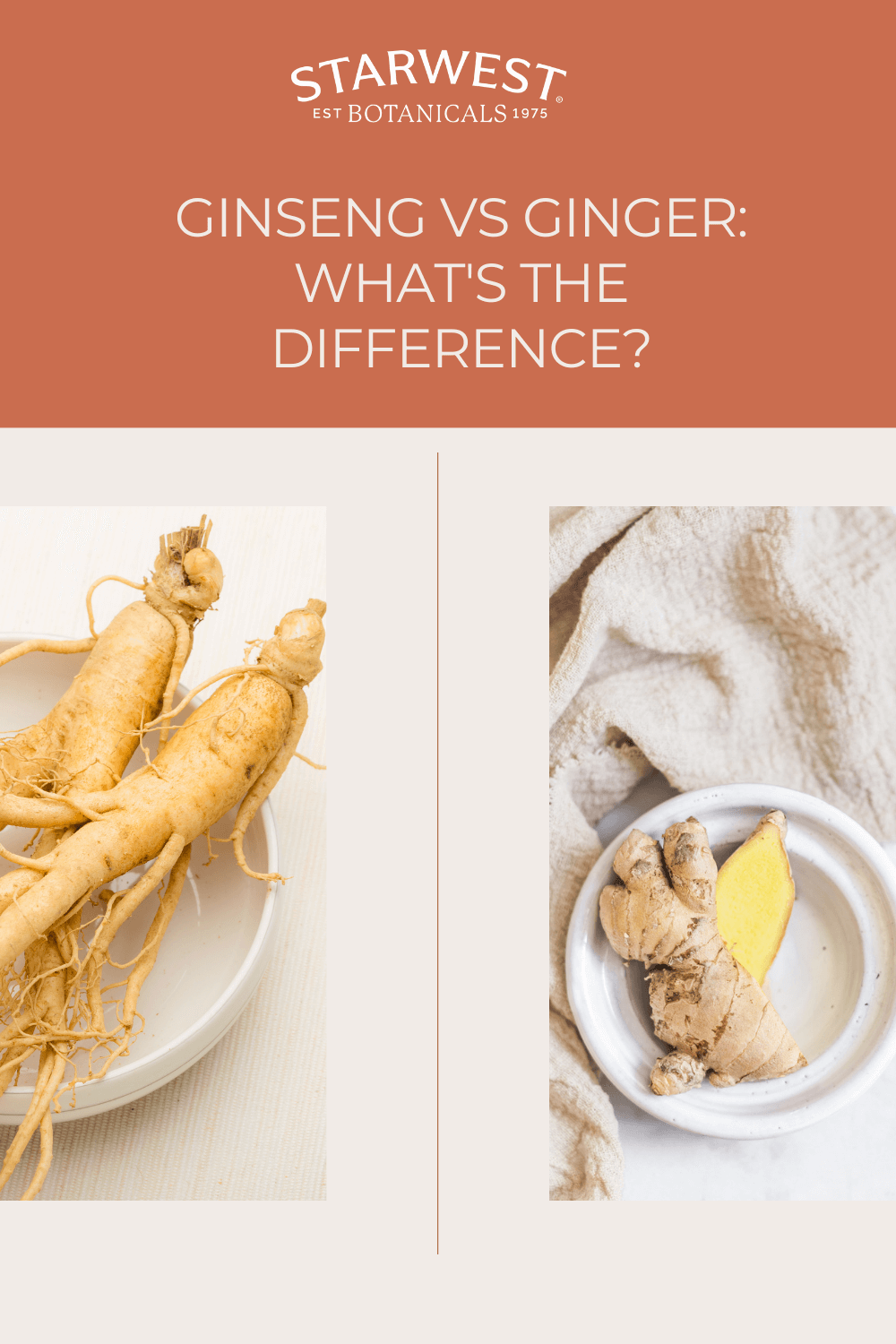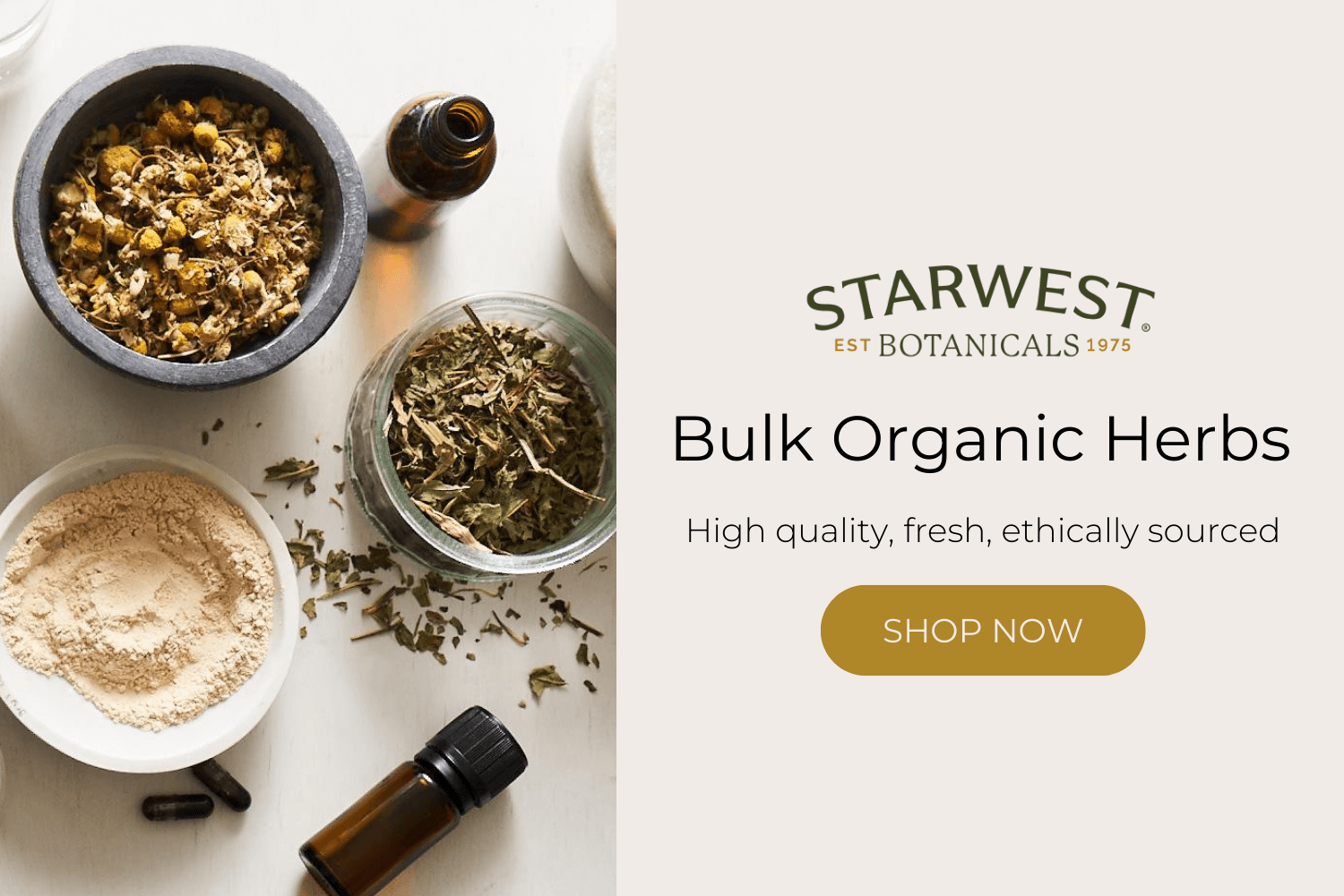Ginseng vs Ginger: What's the Difference? | Starwest Botanicals
Posted by Starwest Botanicals Content Team | Medically Reviewed by Daniel Powers, MS on 03-22-2023

Whether you’re aiming to eat more leafy greens, take more bicycle rides, or capture more high-quality sleep, we’re all seeking ways to be healthier. But if you’re also seeking additional methods to boost your health and wellness, you may have heard of the beneficial properties of herbs like ginseng powder and ginger.
Both herbs have long played a part in Traditional Chinese Medicine, where they have been used for centuries for a variety of purposes. But when it comes to what they offer your wellness, ginseng and ginger are actually quite different.
To determine if you could benefit from ginseng, ginger, or both, you’ll first want to explore the origins of these powerful plants. Then, you can discover all the unique qualities of ginseng vs ginger and what potential ways these plants might benefit your well-being.
Ginger 101
Have you ever purchased fresh ginger? If so, you’re likely familiar with its raw form as an awkward-looking, somewhat ugly, knobby root. Don’t let its appearance fool you, though. Ginger has an amazing, powerful, spicy taste and can be used to flavor a wide variety of dishes.
Ginger belongs to the same family as both cardamom and turmeric. All three are native to Southeast Asia and are key ingredients in cooking within many cultures.
The fresh root variety isn’t the only way you can purchase ginger. It’s also available in the following forms:
- Powdered, dry ginger
- In liquid form in oils and juices
- As a paste
- As ginger tea
- In supplements
At Starwest Botanicals, we have a full line of ginger products!
Whichever way you prefer to consume ginger, be it in dishes, ginger extract, or as a herbal tea, you could stand to benefit from some of the herb’s possible health and wellness advantages.
Potential Health Benefits of Ginger
Ginger hasn’t only been popular for centuries because of the flavor it adds to foods. The herb has also long been thought to have some significant health benefits.
Some potential wellness properties ginger may have include:
- Antioxidant properties – Ginger root contains very high levels of antioxidants. These potent compounds may help protect your cells from oxidative stress.
- May support healthy joint function – There are some indications that those who take ginger supplements help to support joint health.
- Alleviating nausea and vomiting – One of the most widely known and studied benefits of ginger is its ability to help with issues such as nausea and vomiting. Its potential digestive relief properties might help those who are experiencing morning sickness during pregnancy, undergoing chemotherapy, or have post-surgery nausea.
How Can You Use Ginger?
here are many ways you can use ginger. If you purchase fresh ginger, you’ll first want to peel the skin from the root to reveal the pale yellow flesh. You can then slice or grate the flesh into certain dishes to provide a healthy and lively burst flavor.
Dry, powdered ginger is also easy to add to dishes, beverages, and baked goods.
Finally, you can also try ginger supplements. However, it’s important to remember that most supplements aren’t regulated by the FDA. Make sure you’re only purchasing supplements from a verified supplier to ensure that you can trust what the bottle claims to contain.
Are There Potential Risks Associated with Ginger?
Most people can tolerate ginger with little to no negative reaction. However, there are certain medications that ginger may interfere with. These can include:
- Blood thinners
- Blood pressure medications
- Diabetes medication
If you regularly take any medications, you should speak with your doctor before adding ginger or any other supplements to your wellness routine to ensure that there won’t be an interaction.
Ginseng 101
Like ginger, ginseng is a root that primarily grows in Asia—although one variety known as American ginseng grows throughout the midwestern United States.
You may also have heard of other types of ginseng like Korean ginseng or Korean red ginseng, Panax ginseng, and Siberian ginseng. The version grown in the United States, Panax quinquefolius, is yellow in color and milder in flavor.
Meanwhile, Asian ginseng is spicier and red in color. But what is ginseng good for?
Potential Health Benefits of Ginseng
Ginseng’s use in traditional Chinese medicine dates back centuries. Although many of the purported benefits require further study to confirm the medical viability, potential ginseng tea benefits or other forms of ginseng consumption include:
- May help support the immune system – Research shows that ginseng may also help improve immune function. This could be important for those who have weakened immune systems.
- May help to support brain function – Ginseng may also help to enhance your brain function, memory, and cognition. Some improvement in quality of life and behavior may also result in those suffering from cognitive decline, although further studies on a larger scale are needed.
- Improving energy levels – Data collected from a few studies indicates that daily doses of ginseng over an eight-week period may have helped to increase energy levels. However, additional research is needed to draw conclusions about the potential energy-boosting benefits of ginseng for others.
How Can You Use Ginseng?
There are several ways you could choose to incorporate ginseng into your wellness routine. Some popular methods of use include:
- Slicing and eating it raw
- Stewed in boiling water as ginseng tea
- Added to green tea
- Added to soups, stir-fries, and curries
- As a supplement
Like ginger, ginseng comes in many different shapes and forms—from the raw root to extracts and powders. Fortunately, this means you have plenty of options for incorporating ginseng into your wellness routine.
Are There Potential Risks Associated with Ginseng?
While it may have potential health and wellness benefits, ginseng can also present risks to certain people. Some of the side effects associated with both types of ginseng, particularly when consumed in supplement form, may include:
- Nervousness
- Blood pressure changes
- Gastrointestinal distress
- Breast pain and vaginal bleeding
- Allergic reactions
- Liver problems
Ginseng can also interact with certain medications and supplements, including:
- Caffeine and alcohol
- Blood thinners
- HIV medication
- Immunosuppressants
- Antidepressants
- Diabetes medication
As always, you should speak with your doctor before adding a supplement to your routine, especially one that may cause some more serious reactions in some people.
Which is Better: Ginseng or Ginger?
There isn’t a concrete answer to the question of whether ginseng or ginger is better. It depends on what you want to use the herb for and your existing health conditions and medications.
Let’s summarize the difference between ginseng and ginger to help you determine what might better suit your wellness needs.
Ginger’s strongest potential comes in the following realms:
- Reducing nausea and vomiting
- Flavoring stir-frys, curries, soups, baked goods, and more
So, if you’re looking for a product to help you manage nausea or simply want to add a little zip to your cooking repertoire, then ginger may be a good choice for you.
In contrast, ginseng is primarily thought to help manage energy levels and give your brain a slight boost. However, ginseng does have more potential side effects, particularly when taken in high concentrations as a supplement.
Therefore, the better option for you depends on your wellness goals and if you take medications that may interact with either ginger or ginseng.
Can You Take Ginger and Ginseng Together?
If you don’t have any existing health conditions and you don’t take medications that could interact with these two herbs, you don’t necessarily need to decide between ginger vs ginseng.
That’s because there aren’t any known interactions between these two roots. That being said, it’s still important to ensure that you can take them both safely by speaking with your doctor beforehand.
Stock Your Supply of Ginger and Ginseng with Starwest Botanicals
When you’re looking to support your wellness, both ginger and ginseng have the potential to provide some powerful benefits.
Even better, both are also delightful additions when used in cooking. Ginger is delicious and spicy when added to many different types of dishes, while ginseng can add a pop of flavor to your favorite meal or be sipped as a tasty tea.
If you’re interested in exploring the wellness boosts these two herbs can provide, start with Starwest Botanicals.
At Starwest Botanicals, we have a wide selection of ginger products and ginseng powder to suit your needs. You can shop powders, teas, extracts, and more, all with the confidence that you’re purchasing high-quality products you can trust.
Support your wellness with Starwest Botanicals today.
References:
PubMed. Ginger on Human Health. https://www.ncbi.nlm.nih.gov/pmc/articles/PMC7019938/
Mount Sinai Hospital. Ginger. https://www.mountsinai.org/health-library/herb/ginger
PubMed. Anti-oxidative Effects of Korean Red Ginseng Extract. https://pubmed.ncbi.nlm.nih.gov/21494373/
Research Gate. The Power of Natural Chinese Medicine. Ginger and Ginseng Root in and Organic Life. https://www.researchgate.net/publication/331745993_The_Power_of_Natural_Chinese_Medicine_Ginger_and_Ginseng_Root_in_an_Organic_Life
The Botanical Institute. Ginseng vs Ginger. https://botanicalinstitute.org/ginseng-vs-ginger/



